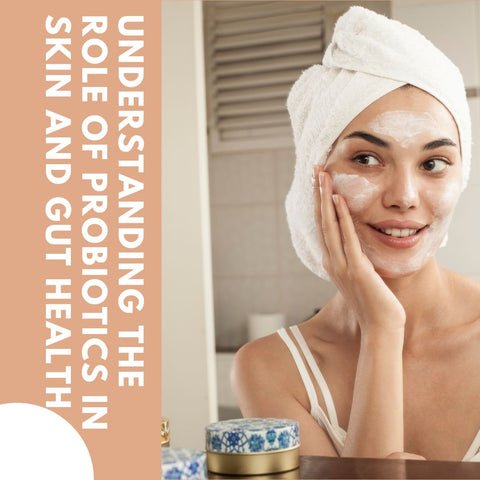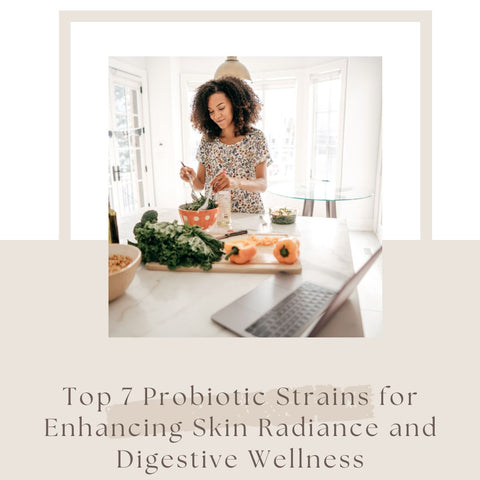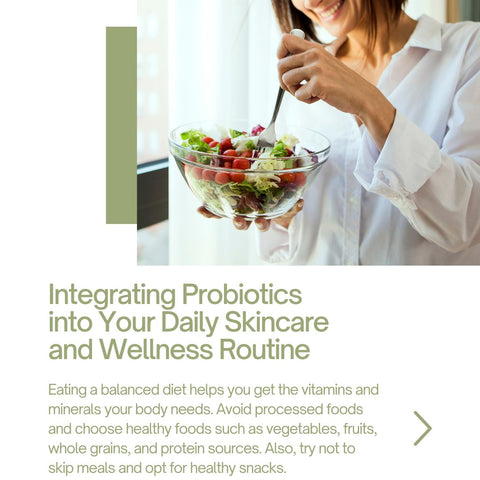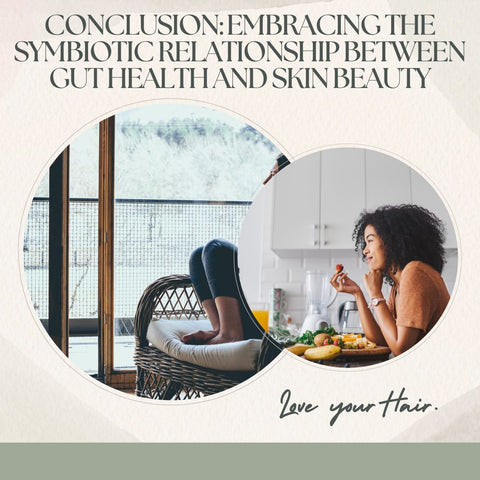Beauty cultivation includes comprehensive methods that take into account interior aspects like gut health in addition to outward skincare regimens. Probiotics, sometimes known as "good" bacteria, are important for maintaining healthy skin and general well-being. In this blog, let's examine how maximising the benefits of probiotics can support healthy gut function and radiant skin.
Understanding the Role of Probiotics in Skin and Gut Health

It is important to recognise how these two systems are interrelated to comprehend the impact that probiotics play on gut and skin health. Probiotics, sometimes known as "good" bacteria, are vital for preserving a balanced population of microorganisms in the stomach, which can affect certain skin health issues. Let's explore the important elements, including regulating skin conditions, immune system support, balancing the gut microbiota, managing fermented foods and probiotics, probiotic supplements, exterior applications, and a holistic approach. Keeping up a well-balanced lifestyle with meals high in probiotics, supplements when needed, and appropriate skincare routines helps cultivate the best possible health from the inside out.
Exploring the Connection Between the Gut Microbiome and Healthy Skin
Dermatology and gastrointestinal researchers are increasingly exploring the intriguing link between a healthy gut microbiota and good skin. The gut microbiome, which includes billions of bacteria, fungi, and viruses, has a significant impact on skin health. This ecosystem is essential to sustaining general health. The gut microbiota and healthy skin are linked in the following important ways:
-
Microbiome Diversity: A diverse and balanced gut microbiome has been linked to better overall health, and this diversity extends to the skin. Imbalances in the gut microbiota may contribute to skin problems.
-
Immune System Regulation: The gut-skin axis is a two-way communication system that connects the gut and skin. The gut microbiome influences the immune system, which is important for skin health and pathogen defence.
-
Inflammation and Skin Conditions: Imbalances in the gut microbiota can cause systemic inflammation, which can exacerbate acne, eczema, and psoriasis.
-
Nutrient Absorption: The gut microbiome contributes to the absorption of nutrients from food. Proper nutrient absorption is critical for skin health, influencing things like collagen production and elasticity.
-
Short-Chain Fatty Acids (SCFAs): The gut microbiota generates metabolites, including short-chain fatty acids (SCFAs), which have been shown to have anti-inflammatory properties and may benefit skin health.
-
Probiotics and Skin Conditions: Some studies indicate that probiotics, which promote a healthy gut microbiome, may help manage certain skin conditions, but more research is needed to draw definitive conclusions.
-
The Gut-Brain-Skin Connection: Stress can affect both the gut and the skin. The gut-brain-skin axis emphasises communication between the gut, central nervous system, and skin, implying that stress reduction can benefit skin health.
-
External Manifestations of Internal Issues: Skin conditions are frequently viewed as external manifestations of internal problems. Addressing gut health may help manage or prevent certain skin problems.
-
Prebiotics and Fibre: Prebiotics, or fibres that feed beneficial gut bacteria, can help to promote microbial diversity and gut health.
-
Lifestyle Factors: Diet, antibiotic use, and lifestyle choices all influence the gut microbiome. A balanced and diverse diet, combined with a healthy lifestyle, can improve gut and skin health.
-
Individual Variations: The relationship between the gut microbiome and skin health is unique, and responses may differ. Genetics, environmental exposures, and personal health history all contribute to variability.
Unveiling the Benefits of Probiotic Supplements for Skincare
Probiotic supplements have drawn attention for their potential advantages for both digestive health and skincare since they include good bacteria that support a healthy gut microbiota. While studies are still being conducted, some point to the potential benefits of probiotic supplementation for skin health. Probiotic supplements have the potential to improve skin health, reduce inflammation, produce metabolites, manage skin conditions, protect the skin, support skin structure, work well for individual variations, reduce stress, be used in combination with other skin care techniques, and consult with professionals.
Top 7 Probiotic Strains for Enhancing Skin Radiance and Digestive Wellness

Several probiotic strains have demonstrated potential benefits for both digestive and skin health. While individual responses may vary, here are seven probiotic strains that have been linked to improved skin radiance and digestive health:
-
Lactobacillus acidophilus: Known to support a balanced gut microbiome, which in turn supports digestive health. Skin benefits include reduced inflammation and support for a healthy gut-skin axis.
-
Bifidobacterium bifidum: Digestive health affects both immune system support and gut balance. Promotes a healthy skin microbiome and may aid in the management of inflammatory skin conditions.
-
Lactobacillus rhamnosus: Linked to intestinal well-being and potentially useful in reducing discomfort related to digestion. It may have anti-inflammatory properties that help maintain skin health.
-
Bifidobacterium longum: It enhances gut health and contributes to the preservation of a harmonious microbiome. May improve the condition of the skin by lowering inflammation and oxidative damage.
-
Lactobacillus reuteri: Supports gut microbiota balance and may alleviate digestive issues. Proven to have anti-inflammatory properties that may be advantageous to the skin.
-
Lactobacillus plantarum: Improves gut health and helps to maintain a diverse microbiome. Antioxidant properties that promote skin health.
-
Saccharomyces boulardii: This yeast is beneficial to gut health and may aid in the management of digestive issues. Skin benefits include the ability to improve skin conditions such as acne and eczema.
Decoding the Science Behind Probiotics and Inflammation Reduction
The science of probiotics and their ability to reduce inflammation is a dynamic and intricate area of research. Although investigations are still in progress, data indicates that some probiotic strains might have an impact on immune response modulation and inflammation reduction. Below is a summary of the main mechanisms and research findings:
-
Gut Microbiome and Immune System: The gut microbiome, which contains trillions of microorganisms, is essential for immune system regulation. Probiotics, when introduced into the gut, can alter the balance of beneficial and harmful bacteria, affecting the overall immune response.
-
Anti-Inflammatory Effects: Some probiotic strains, including Lactobacillus and Bifidobacterium species, have anti-inflammatory properties. Probiotics may reduce the production of pro-inflammatory cytokines while increasing the release of anti-inflammatory cytokines, thereby helping to balance immune responses.
-
Gut-Brain Axis: The gut-brain axis connects the gut and the brain, and communication between them can influence inflammation. Probiotics may help with stress management by reducing stress-related inflammation.
-
Short-Chain Fatty Acids (SCFAs): Certain probiotic strains, particularly those from the Bifidobacterium genus, can produce short-chain fatty acids (SCFAs) during the fermentation of dietary fibres. SCFAs, such as butyrate, have anti-inflammatory properties and promote gut health.
-
Regulation of Toll-Like Receptors (TLRs): Probiotics may interact with Toll-Like Receptors (TLRs) in the gut lining, influencing the immune response. By modulating TLR activity, probiotics can contribute to the regulation of inflammation.
-
Impact on Systemic Inflammation: The gut is a major site of immune activity, and imbalances in the gut microbiota can cause systemic inflammation. Probiotics may help restore balance and reduce the body's overall inflammatory burden.
-
Targeting Specific Conditions: Probiotics have been studied in conditions associated with inflammation, including inflammatory bowel disease (IBD), irritable bowel syndrome (IBS), and dermatological conditions. The results vary, but probiotic supplementation may improve symptoms for some people.
-
Strain-Specific Effects: Different probiotic strains may have distinct effects on inflammation. The strain specificity of probiotics highlights the importance of choosing supplements based on their intended benefits.
-
Individual Variability: Individual differences in response to probiotics can be attributed to factors like heredity, nutrition, and general health. It's critical to take into account each person's unique needs and seek the advice of medical specialists for tailored recommendations.
-
Prebiotics and Synbiotics: Probiotics can work better when combined with prebiotics, which are fibres that support good bacteria. Combinations of probiotics and prebiotics, known as synbiotics, may have synergistic effects on gut health and reduce inflammation.
Mastering the Art of Balancing Your Skin Flora for a Radiant Complexion
Understanding how to balance the flora on your skin is essential to having a glowing complexion. Containing trillions of bacteria, the skin's microbiome is essential to preserving the health and beauty of the skin. The following are some tips for achieving a glowing complexion through skin flora balance:
-
Gentle Cleansing: Use a gentle, pH-balanced cleanser to remove impurities without disrupting the skin microbiome's natural balance. Over-cleansing can deplete the skin's natural oils, potentially leading to imbalances.
-
Probiotic Skincare Products: Consider using skincare products that contain probiotics or prebiotics. Beneficial bacteria are directly introduced into the skin. Prebiotics are nutrients that promote the growth of beneficial bacteria that are already present.
-
pH-Balanced Products: Choose skincare products with a pH that is similar to the skin's natural pH (4.7 to 5.75). Maintaining an acidic environment promotes the growth of beneficial bacteria while inhibiting harmful microbes.
-
Avoid Harsh Ingredients: Steer clear of skincare products with harsh chemicals that can disrupt the skin barrier and microbiome. Avoid products with high alcohol content, as alcohol can be drying and disruptive.
-
Nutrient-Rich Diet: Maintain a diet rich in fruits, vegetables, and whole foods to provide essential nutrients for skin health. Consume prebiotic-rich foods like garlic, onions, and bananas to support the growth of beneficial bacteria.
-
Hydration: Keep the skin well-hydrated to support a healthy skin barrier. Humectant ingredients like hyaluronic acid draw moisture to the skin.
-
Sun Protection: Protect your skin from UV damage by using sunscreen. Excessive sun exposure can negatively impact the skin microbiome.
-
Manage Stress: Chronic stress can affect the skin microbiome. Practice stress management techniques like mindfulness and relaxation exercises.
-
Avoid Antibacterial Products: Antibacterial soaps and harsh cleansers can disrupt the balance of the skin microbiome. Opt for gentle cleansers that do not contain antibacterial agents.
-
Individualized Approach: Recognize your skin type and individual needs. Adjust your skincare routine based on your unique characteristics.
-
Probiotic Supplements: Consider probiotic supplements for internal support. Consult with healthcare professionals for personalized recommendations.
-
Regular Assessments: Pay attention to changes in your skin. If you notice persistent issues, consult with dermatologists or skincare professionals.
-
Gradual Changes: When changing your skincare routine, introduce new products gradually to observe how your skin responds.
-
Professional Guidance: For persistent skin concerns or personalized advice, consult with dermatologists or skincare professionals.
Integrating Probiotics into Your Daily Skincare and Wellness Routine

Integrating probiotics into your daily skincare and wellness routine can contribute to a balanced skin microbiome and overall well-being. Here's a guide on how to incorporate probiotics seamlessly into your routine:
-
Choose Probiotic Skincare Products: Look for skincare products that specifically state the presence of probiotics or probiotic-derived ingredients. Examine product labels for probiotic strains such as Lactobacillus, Bifidobacterium, and others.
-
Probiotic-Rich Cleansing: Cleanse your face with a gentle, probiotic-rich cleanser. This helps to remove impurities while preserving the skin's natural microbiome.
-
Prebiotic and Probiotic Foods: Incorporate prebiotic-rich foods like garlic, onions, and bananas, as well as probiotic-rich foods like yoghurt and kefir, into your daily diet. Consider probiotic supplements, especially if your diet does not contain enough probiotics.
-
DIY Probiotic Masks: Make your face masks with plain yoghurt, which is rich in probiotics. Apply it to your face for a refreshing and probiotic boost.
-
Probiotic Supplements: Before adding probiotic supplements to your daily routine, consult with a healthcare professional to ensure they are appropriate for your specific health needs. Select high-quality probiotic supplements with a variety of strains and appropriate CFUs.
-
Time Your Probiotics: Whether using skincare products or supplements, use probiotics consistently to allow time for positive effects on the skin.
-
Balance with Prebiotics: Look for skincare products that contain prebiotic ingredients. Prebiotics nourish the beneficial bacteria that already live on your skin.
-
Internal and External Balance: Address both internal and external factors to achieve a comprehensive approach to skincare and wellness. Maintain a healthy lifestyle by eating well, staying hydrated, and managing your stress levels.
-
Sun Protection: For additional skin protection, consider using sunscreens that contain probiotics.
-
Observe Your Skin: Pay attention to how your skin reacts to the addition of probiotics. Notice changes in your skin's complexion, hydration, and overall health.
-
Professional Guidance: If you have specific skin concerns or conditions, speak with a dermatologist or skincare professional for personalised advice.
-
DIY Probiotic Toner: Brew green tea, let it cool, and mix it with a few drops of probiotic liquid. Use it as a DIY probiotic toner for a refreshing boost.
-
Probiotic Wellness Routine: Consider integrating probiotics into your overall wellness routine, not just limited to skincare. This can include dietary choices, supplements, and lifestyle practices.
Creating a Holistic Approach to Beauty with Probiotic and Prebiotic Supplements
Using probiotic and prebiotic supplements to create a holistic approach to beauty means taking into account both external and internal elements that support beautiful skin and general well-being. This is a thorough guide on how to incorporate probiotics and prebiotics into your skincare routine. It covers things like taking probiotic and prebiotic supplements, hydrating your skin, managing stress, eating a probiotic-rich diet, using external skincare products, making homemade probiotic masks, listening to your skin, seeking professional advice, being consistent, monitoring your progress, and tracking your results.
Consulting with Dermatologists for Personalized Probiotic Skincare Solutions
Dermatologists can provide personalised probiotic skincare recommendations based on your specific skin type, concerns, and health profile. Here's how to approach a consultation with a dermatologist for probiotic skincare.
-
Research and Choose a dermatologist: Look for board-certified dermatologists who specialise in skincare and promote holistic approaches. Check reviews and testimonials to ensure that the dermatologist has a good reputation.
-
Prepare for the Appointment: Document your skin history, including any previous conditions, treatments, and current skincare regimen. Make a note of any dietary restrictions, stress levels, or sleep schedules.
-
Communicate Your Goals: Communicate your skin concerns, whether they are acne, sensitivity, ageing, or specific conditions such as eczema or rosacea. Share your desired outcomes, such as increased hydration, reduced redness, or addressing specific concerns.
-
Discuss Your Current Skincare Routine: Provide information about your current skincare regimen, including cleansers, moisturisers, and any treatments. Discuss how frequently you use each product and your overall skincare routine.
-
Mention Your Interest in Probiotics: Express your interest in incorporating probiotics into your skincare routine. If you're taking probiotic supplements, inform the dermatologist about the specific strains and dosages.
-
Understand Your Skin Type: Allow the dermatologist to determine whether your skin is oily, dry, combination, sensitive, or normal. Please share any sensitivity or reactions you have had with specific products.
-
Receive Personalized Recommendations: Depending on your skin type and concerns, the dermatologist may recommend specific probiotic skincare products. Get advice on how to incorporate probiotics into your current routine or make changes for the best results.
-
Address Other Contributing Factors: Dermatologists may take a holistic approach to your skin, taking into account factors such as diet, stress, and overall health. You will receive lifestyle recommendations to help you improve your skin health.
-
Follow-Up Plan: Make a follow-up plan to track the progress of your skincare routine. Based on your skin's response, you can make changes to your probiotic skincare regimen.
-
Ask Questions: Do not be afraid to ask questions about probiotics, their potential benefits, and how they interact with the skin. Ask for clarification on recommended probiotic products, their ingredients, and how to use them.
-
Combine Professional and At-Home Care: Discuss potential in-office treatments to supplement your at-home probiotic skincare routine. Use a dermatologist's expertise for both professional and daily skincare practices.
-
Stay Consistent: Consistency is key when following recommendations. Follow the dermatologist's personalised recommendations for the best results.
Conclusion: Embracing the Symbiotic Relationship Between Gut Health and Skin Beauty

Achieving comprehensive well-being and bright skin requires accepting the symbiotic relationship between gut health and skin beauty. The complex relationship between the stomach and the skin emphasises the importance of taking an integrated approach to health and beauty. The key takeaways include a personalised approach to beauty, patience and consistency, understanding the gut-skin axis, the importance of a balanced gut microbiome, probiotics for gut and skin harmony, prebiotics as nourishment for beneficial bacteria, holistic lifestyle practices, radiant skin through internal and external care, scientific advancements and ongoing research, and the ever-changing beauty journey.
Incorporating Gut-Skin Wisdom into Your Routine:
-
Include probiotic-rich foods, prebiotics, and supplements in your diet to improve gut health.
-
Choose skincare with probiotics and prebiotics to support the skin microbiome.
-
Consult a healthcare professional or a dermatologist for personalised gut health and skincare tips.
-
Embrace a holistic lifestyle that promotes both internal and external well-being.
















